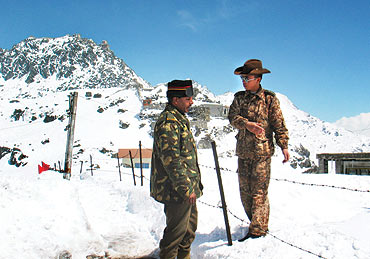 Whether Salman Khurshid goes to Beijing or cancels the trip, the Chinese won’t return from their present, newly occupied position, says Tarun Vijay.
Whether Salman Khurshid goes to Beijing or cancels the trip, the Chinese won’t return from their present, newly occupied position, says Tarun Vijay.
I agree that the Chinese incursion issue must not be hyped and efforts should be made to find a diplomatic resolution.
I also agree that, in a moment of national crisis, no politics should be played. The government’s efforts to safeguard the nation’s boundaries should get unanimous support.
It helps to boost the morale of the armed forces who are facing a hostile situation in a very uncharitable terrain. They are our sons, brothers and daughters. They belong to us. They are us.
In a moment of filmi frenzy, we shouldn’t forget that they listen to and read what we say and write.
India must behave as one unit instead of creating scenes of street fights during such crises. And I am proud to say, we have always shown the ability to do so; whether it was 1962 or Kargil.
Secondly, 2013 is not 1962.
We are much stronger, people are much more aware and the soldier is prepared to win a war against the Chinese if the situation reaches that point.
But a war is not won by comparing the list of nuclear bombs and other arsenal with the enemy. Wars are won in the minds of those who have an unflinching commitment to their motherland and a decisive fire in their heart to punish the wrongdoer foe.
The most significant fuel of this victory is the ruling political power’s support and leadership, which must not dither midway.
That is exactly the problem today.
One remembers Indira Gandhi and Atal Bihari Vajpayee, who had resolutely stood behind their armed forces with a steel spine and given the go-ahead that brought the honour of victory to the nation.
The Ladakh issue will be resolved, but the political mishandling of the incident has cost us very dear.
There are strong suspicions that certain external factors have worked hard to make the matter look graver -- almost as if an aggression has taken place -- to incite an exchange of fire between the two forces at Ladakh.
Whose interest would have been served if the Chinese prime minister’s first visit to India had been cancelled?
Who were shamelessly putting the Indian soldier at a much inferior level while comparing him to China’s People’s Liberation Army?
Was that kind of defeatist ranting on television screens helping the jawan camping before the Chinese at altitudes as high as 17,000 feet?
The culprit is the nation’s political leadership that has not concerned itself with ensuring adequate military preparedness.
It is the same lethargic, Nehruvian delusion that had led ordnance factories in the '50s to make coffee machines and had led to the utterance of those infamous words at the loss of Aksai China that not a blade of grass grows there.
It’s a government that fails to protect the life of an innocent Indian, Sarabjit Singh, while sharing biryani with a savage country’s prime minister.
It’s a powerless, visionless and aimless government that dithers when it comes to protecting the honour of its honest and patriotic surveyor general against the lies of an American mapping agency.
Such a leadership is an embarrassment to the nation and to the dictionary, which provides a different meaning to the word ‘leadership’.
Whether Salman Khurshid goes Beijing or cancels the trip, the Chinese are not returning from their present, newly occupied position. Their statements are a clear indication of their attitude.
They feel they are in their territory; that Indians are making a foolish hue and cry over nothing. In fact, the official Chinese position holders have said that Indians are fishing in China’s troubled waters.
It’s important to read what the official position of the Chinese is on this issue. The Global Times, the official English language news daily from Beijing has published a detailed report on the Ladakh incursion quoting three officials.
The foreign ministry first said it couldn’t verify the matter, because it doesn’t have the relevant information.
The spokesperson for the foreign ministry simply dismissed the Indian complaint and sought to portray the issue as a small matter, saying that in the absence of the final demarcation of the border, such incidents are inevitable.
But the director of the Center for Arms Control and Disarmament at the School of International Studies under Peking University, Han Hua, took an offensive stand and blamed India for ‘fishing in troubled waters’.
This line has been picked up by the local twitterati in China. Once again, an anti-Japan like passion against India is seen to be dominating Chinese social media.
The three comments must be read to properly assess the tone and tenor of the belligerent Chinese response on an issue that has aroused so much anger in India.
For the Chinese, the whole issue is an Indian creation; it is a false accusation; no Chinese has ever crossed the Line of Actual control. India has unnecessarily hyped this issue, they feel, that too just before the Chinese prime minister’s Delhi visit which, if it materialises, will be his first foreign trip after assuming office.
Reaction no 1: When contacted by the Global Times on Thursday, China's foreign ministry said it couldn't verify the news, as it doesn't have the relevant information at present.
The Indian embassy in Beijing referred the inquiry to China's foreign ministry without confirming the report. If verified, it would be Li's first overseas visit as premier.
Reaction no 2: After dismissing reports about alleged trespassing by Chinese troops for three days in a row, on Thursday, Hua Chunying, spokeswoman for China's foreign ministry, once again refuted accusations that China had provoked border tensions.
"China and India are neighbours. Given that their lines of demarcation haven't been finalised, it's inevitable that problems may arise in the border region.
Reaction no 3: Han Hua, director of the Center for Arms Control and Disarmament at the School of International Studies under Peking University, told the Global Times that choosing India as the first stop of the premier's visit shows China's will to improve ties, but that the current standoff may cast a shadow on the visit.
‘Reports about Chinese troops' cross-border patrols are not rare in Indian media. However, the latest hyping came at an inappropriate time before the premier's visit, and it was also inappropriate to summon the ambassador,’ Han said, adding there had been speculation that New Delhi may hope to ‘fish in troubled waters’ as Beijing is caught in an island dispute with Tokyo.
India loses nothing by showing a little patience and even as she reinforces her fortification.
But this government is mired in too many domestic issues and is showing a tendency of ‘giving up’. It needs to hold on till the next government is chosen more wisely by the electorate but seems to be incapable of even doing that.
It is indeed a sad moment in our history.
Tarun Vijay is a member of the Rajya Sabha; member, Parliamentary Standing Committee on External Affairs, national spokesperson for the Bharatiya Janata Party and honorary director, Dr Syama Prasad Mookerjee Research Foundation, New Delhi.
Photograph: Reuters











 © 2025
© 2025